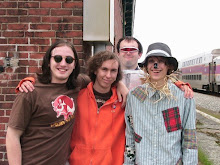After reading Tonya Krouse’s essay that got posted on the main blog I’ve decided to try to tackle one of the questions she proposes at the end;
“Who can “do” feminist theory? Who can be a feminist? Why do you think so?
I think that this is really what feminist theory, and arguably most of the theories we’ve studied so far, boil down to; what good can they actually bring us. I think that anyone can “do” feminist theory as long as they’ve got some idea of what that actually means. Everyone in our class knows that there are many different forms of feminism in both theory and practice, and that some who consider themselves feminists are in strong disagreement and/or often downright upset with others who say the same. I hope that you’d be hard pressed to find anyone who disagrees with first wave feminism here at Emmanuel, and if you do I hope they’re smart enough to keep their mouths shut. As far as arguing between dissecting the nature of the patriarchal heteronormative system that we live in and add women and stir approaches, there’s a whole lot of people who feel that adding women is good enough, that we can cause enough change to bring social equality within the system as it stands. Third wave feminists, the people who want more than adding women and stirring, claim that the very nature of the systems in place (social, economic, religious, etc.) today make it impossible for women to gain equality within the system. These feminists want to either make a whole new set of systems from scratch that doesn’t discriminate or marginalize women and/or reveal the problems of the system in place by studying then and revealing their true nature.
Now that we’ve established that it’s difficult to define exactly what a feminist is, it’s even hard to discern exactly what said feminists really do. What does it mean to “do” feminism? Does that mean study texts and the world around us with a feminism always in mind, or does it mean always including and hiring women simply because they’re women, or even letting women vote because they’re people too? If doing feminism is simply treating women with equal respect and dignity as men, than anyone who doesn’t identify themselves as a feminist is, at least in my book, a bad person. I honestly don’t think that everyone is capable of the kind of mindset it takes to attempt third wave feminist thinking; some people will always be too set in their ways, and many people are just stupid. Even so, everyone is capable of least trying to understand higher feminist philosophy, with obvious exceptions in mind (like how there’s nothing wrong with a 4 year old not getting it yet, provided that s/he does once s/he’s older and capable of doing so). I guess for some people, adding women and stirring is better than nothing, hopefully their hearts are in the right place even if their heads are still catching up.
Despite what people have been trying to tell me since long before I took this class, feminism is not over. Feminism won’t be “over” until there’s no such thing as discrimination against not only women, but all marginalized groups is every society in the world. I’m way to pessimistic about people, filthy and miserable as they are, to assume that this will ever happen. Feminism didn’t stop happening after the demonstrations and bra burnings of the 1970’s, its still alive and making progress today. With that in mind, one need only walk around Emmanuel campus and start asking questions (what is a feminist? Are you a feminist? Etc.) to realize that feminism has a lot of followers to win over and a lot of work to do.
